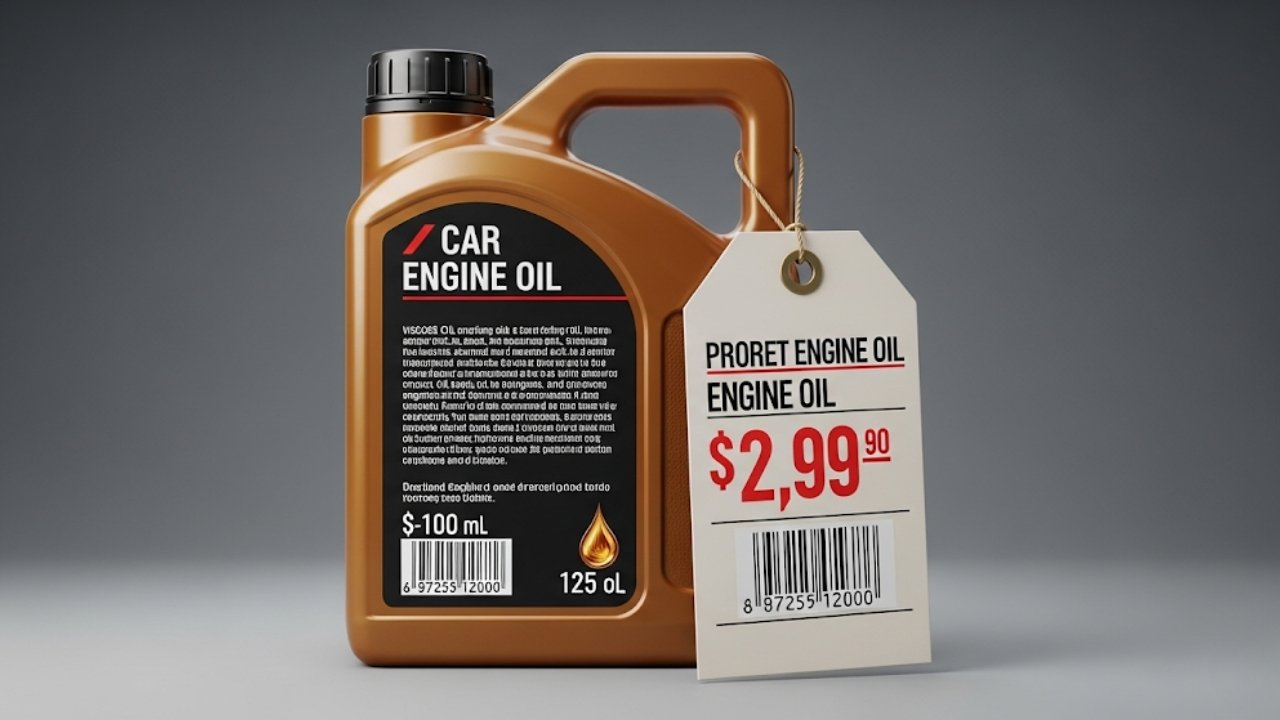Car Engine Oil Price: What You Need to Know

Let’s be real for a second — no one likes being surprised at the checkout counter, especially when you’re standing at an auto shop with your car’s hood popped open. You came in for a simple oil change, and suddenly you’re hit with numbers you didn’t expect. “Wait… why is the car engine oil price this high?” Sound familiar?
Whether you’re a gearhead or someone who just wants their car to run smoothly, engine oil prices matter. And they can vary wildly based on the brand, type, quality, and even where you’re buying it. But don’t worry — we’re about to unpack all of it like two friends talking over coffee. I’ll even share some personal stories and practical insights that’ll help you make smarter (and cheaper) choices.
Why the Confusion Around Car Engine Oil Prices?

So what’s going on?
Here’s why car engine oil prices vary so much:
-
Oil Type: Conventional, Synthetic Blend, or Full Synthetic
-
Brand: Mobil 1, Castrol, Valvoline, Pennzoil, and so on
-
Viscosity Grade: 5W-30, 10W-40, etc.
-
Additives and Certifications
-
Store Markup or Online Discounts
-
Location & Sales Tax
Key Takeaway: You’re not just paying for oil; you’re paying for performance, protection, and reputation.
⚙️ Different Types of Engine Oil & Their Price Ranges
To really understand what you’re paying for, let’s break it down by oil type. Here’s a simple comparison table:
| Engine Oil Type | Average Price per Quart | Best For |
|---|---|---|
| Conventional Oil | $4 – $7 | Older engines, light usage |
| Synthetic Blend Oil | $6 – $10 | Balanced performance & value |
| Full Synthetic Oil | $8 – $15 | High performance, newer engines |
| High-Mileage Oil | $7 – $12 | Engines with 75,000+ miles |
| Racing/Performance Oil | $12 – $20 | Sports cars, extreme conditions |
Each of these categories reflects not just quality, but also the technology inside the bottle. Think of it like comparing tap water to mineral water to protein shakes — all are liquids, but not equal.
The Real Cost of an Oil Change (Spoiler: It’s Not Just the Oil)
When people talk about car engine oil price, they often confuse it with the full cost of an oil change. But here’s the thing — oil is only part of the bill. You’re also paying for:
-
Oil Filter: $5 – $15 depending on the brand
-
Labor Costs: $20 – $50 at most places
-
Disposal Fees: Some garages charge to safely discard old oil
-
Optional Additives: Some shops “recommend” extras
So a basic oil change with synthetic oil might end up costing you $60–$90, even if the actual oil was only $30. Sneaky, right?
Tip: Ask for a breakdown before the mechanic starts working. Know exactly what you’re being charged for.
How Often Should You Buy Engine Oil?
You might be tempted to stock up if you see a great deal. But how often will you actually need to change your oil?
Here’s a quick guide based on oil type:
-
Conventional: Every 3,000 – 5,000 miles
-
Synthetic Blend: Every 5,000 – 7,500 miles
-
Full Synthetic: Every 7,500 – 10,000 miles
If you’re commuting daily or drive long highway distances, you’ll likely need oil 2–3 times a year. But if you rarely drive or own a hybrid, maybe just once a year.
Fun Fact: Some high-end synthetics claim to last up to 15,000 miles, but always check your car manual first.
️ Best Brands & Their Price Tags (2025 Edition)
Let’s talk names. Here are some of the top brands and what you can expect to pay for each:
| Brand | Type | Price Range (1 Quart) |
|---|---|---|
| Mobil 1 | Full Synthetic | $9 – $14 |
| Castrol EDGE | Full Synthetic | $10 – $15 |
| Valvoline | Synthetic Blend | $6 – $10 |
| Pennzoil | High-Mileage/Synthetic | $7 – $12 |
| Royal Purple | Premium Synthetic | $12 – $18 |
If you’re shopping on a budget, Valvoline or Pennzoil often offer good performance without the luxury tag. But if you’re driving a turbocharged engine or an imported sports car, Mobil 1 or Castrol EDGE might be worth the extra bucks.
Where to Buy: Online vs Local Stores
Now here’s a trick I learned the hard way. I once bought oil at a local gas station in a hurry — and paid almost double the online price.
Here’s how the pricing typically stacks up:
-
AutoZone / O’Reilly / NAPA: Convenient, but can be pricier
-
Walmart: Usually the best in-store price
-
Amazon: Great deals, especially in multi-packs
-
RockAuto / Advance Auto Parts: Good for bulk orders and variety
Tip: Always check for coupons or bundles — buying a 5-quart jug is often cheaper than buying individual quarts.
What Affects Car Engine Oil Price?
Let’s summarize the major cost influencers in bullets:
-
Base oil quality (Group I to V classification)
-
Viscosity rating (like 5W-30 or 10W-40)
-
Detergents and additives
-
Brand reputation
-
Certifications (API SN, ILSAC GF-6, Dexos, etc.)
-
Retailer markup
-
Import/export duties (yes, some oils are imported!)
And sometimes… it’s just marketing. A fancy bottle doesn’t always mean better oil.
Bulk Buying vs Small Packs: What’s Better?
If you’re someone who regularly changes your own oil, buying in bulk is a smart move. A 5-quart jug of full synthetic oil might cost $27–$35, while buying five 1-quart bottles separately could cost $45–$60. That’s a 30–40% difference, and that adds up fast over the year.
Let me give you a real-life example.
My friend Jason owns a 2012 Toyota Camry. He does his own oil changes and always buys a 5-quart pack of Valvoline Synthetic Blend for under $30 at Walmart. Once, during a road trip, he needed a top-up and bought a single quart from a gas station for $12.99. That’s nearly half the price of the full 5-quart jug!
Lesson: Buying in bulk is almost always more cost-effective if you have a storage spot and do regular oil changes.
DIY vs Mechanic: Where’s the Hidden Cost?
Changing your own oil can feel like a win — you’re saving money, learning about your car, and avoiding labor costs. But there are still hidden expenses, like:
-
Buying a drain pan: $10 – $20
-
Wrenches or oil filter wrench: $5 – $15
-
Gloves & rags: minor cost, but adds up
-
Time & effort: Not everyone enjoys crawling under a car
Mechanics charge more, sure, but they provide convenience and expertise. If your time is limited or you’re not confident with tools, paying for labor might actually save you trouble in the long run.
Still, if you’re interested in learning, a DIY oil change is one of the best beginner car maintenance tasks. YouTube has thousands of guides, and the savings are real.
Environmental Costs: The Hidden Price of Oil
This might sound a bit out of the box, but it’s important. Every time we use engine oil, we generate waste. And improperly disposed oil harms the environment in ways we don’t always see.
Some things to consider:
-
1 gallon of used oil can contaminate 1 million gallons of fresh water
-
Not all quick-lube shops dispose of oil responsibly
-
Many DIYers dump oil in drains or yards, which is illegal and dangerous
Most auto parts stores like AutoZone, O’Reilly, and NAPA offer free oil recycling, even if you didn’t buy the oil from them. So, if you’re changing your own oil, please take it there.
This is part of the real, often overlooked cost of car engine oil, and it’s worth being mindful of.
Is Expensive Engine Oil Always Better?
Not necessarily. Just because a bottle of oil costs $17 doesn’t mean it’s better for your car than the $8 one. In fact, many budget oils meet or exceed the same industry standards as premium ones.
What truly matters:
-
It matches your car’s recommended viscosity
-
It meets the right API or ILSAC certification
-
You change it at the proper intervals
Think of it like buying sunscreen. A $40 sunscreen and a $12 one might both be SPF 50 — you’re mostly paying for branding and marketing. The same logic applies here.
So, yes — car engine oil price can reflect quality, but not always. Read labels, not just logos.
FAQs: Quick Answers to Common Questions
1. What is the average car engine oil price in the USA (2025)?
As of 2025, the average car engine oil price is:
-
Conventional: $5 – $7/quart
-
Synthetic Blend: $6 – $10/quart
-
Full Synthetic: $8 – $15/quart
Prices vary based on brand and store.
2. How many quarts of oil does a car need?
Most cars need 4 to 6 quarts, depending on engine size. Check your owner’s manual for exact specs.
3. Can I mix different brands of engine oil?
It’s not recommended, but it’s not dangerous either — as long as they’re the same viscosity and type. For example, mixing 5W-30 synthetic with another 5W-30 synthetic is usually okay.
4. Is synthetic oil worth the higher price?
Yes, in most cases. Full synthetic oil lasts longer, protects better under heat, and flows well in cold starts. Over time, you may save money by needing fewer oil changes.
5. Why do luxury cars need expensive oil?
Luxury or high-performance cars often run hotter, faster, or longer, requiring better oil stability. Brands like BMW or Mercedes often require specific oil certifications, which come with higher prices.
6. Does cheap oil damage engines?
If it meets your car’s specifications and certifications, it likely won’t harm your engine. Problems arise when you ignore oil change intervals or use oil with the wrong viscosity.
7. Should I buy engine oil from Amazon or local stores?
Amazon is great for deals and convenience — just make sure you’re buying from authorized sellers. Local stores are ideal when you need oil immediately or want expert advice.
8. How do I know if oil is fake or low-quality?
Check for:
-
Tamper-proof seals
-
Correct labels and certifications
-
Trusted retailers only
Avoid super cheap oil on shady websites — it might be diluted or expired.
Final Thoughts: The Real Value Behind the Price Tag
Here’s the truth — car engine oil price isn’t just a number. It’s a reflection of what you value more: peace of mind, performance, longevity, or savings. The key is finding your balance.
If you’re driving an older car just around town? A good synthetic blend might be all you need. Got a high-mileage or performance car? Full synthetic could be a smart investment.
Whatever your choice, don’t stress the label too much. Focus on quality, fit for your car, and changing it on time.
And remember — cars, like people, thrive when taken care of. Show your engine a little love, and it’ll return the favor mile after mile.






